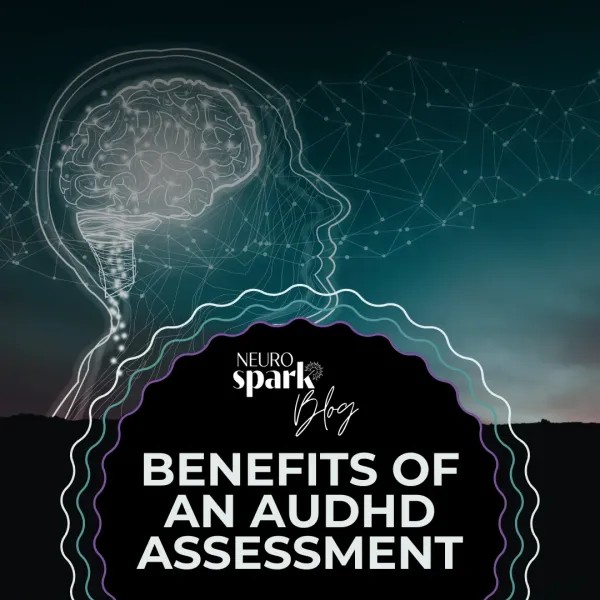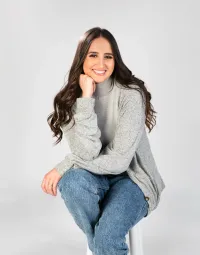Benefits of an AuDHD Assessment: My Lived Experience Perspective

AuDHD Assessment. AuDHD test. AuDHD test online… and one of my personally-used favorites, “AuDHD reddit.” (Whenever I need to check the pulse or hear the lived experience opinion of my communities, I often find myself searching for reddit instead of the popular generic medical sites, because, well, those are not written by us.)
The number of inquiries around AuDHD is only growing. The community is searching for answers about themselves, and I think they’re asking the right questions. It’s not really about “what condition(s) do I have?” but more about how we can understand our neurotype holistically. What do autism and ADHD mean for me, together?
Just like conventional medical models for physical conditions address components/symptoms of a person separately, my experience and knowledge of neurodivergence growing up really were very separate and disjointed. This therapist may diagnose and treat you for one thing, and this psychiatrist may diagnose and treat you for something else, and before you know it, you have one doctor who says your toe is the problem, and one doctor who says your ankle is the problem, and one doctor who says your knee is the problem, but it still hurts to walk. That’s kind of how I felt about my brain. A hot mess with a lot of labels accumulated over the years. None of them fully resonated in a way that ever felt enough.
There was no integrated understanding. Well, actually, before the DSM update in 2013, you couldn’t even be diagnosed with both autism and ADHD. This conversation and recognition are still super new if you think about it. The medical/mental health community is still barely catching up.
But as we know, AuDHD is a package deal, and we need to try to get a grasp of how both autism and ADHD present for us, personally. This is a process that can be pretty confusing. We know that ADHD and autism have some overlap, but I’d venture to say that for me, they are often directly at odds with each other, and sometimes, they can even complement each other.
This is truly a lot to unpack. Even as a therapist. It’s because it’s so individualized for everyone, and thinking of neurodivergence as a spectrum, color wheel, complicated Venn diagram, or web, ultimately, we all just want ANSWERS. The value of self-knowledge and self-discovery is really life-changing. Because when we have that knowledge, we can be in an informed position to know what strategies, accommodations, support, and resources would be useful and relevant to us.
I was diagnosed with ADHD in adolescence, amongst other things. I generally considered it just another label or mental health condition that I carried around with me. It was so compartmentalized. I never had someone help me understand my brain through a neurodivergent, cohesive, and affirming lens. I never viewed myself as an ADHDer. I viewed myself as a person with a diagnosis, barely. Not even. There was no psychoeducation involved, period. It was quarterly 15-minute sessions with a psychiatrist who didn’t take the time to explain anything. I never felt like I had answers for why I was different. Just struggling with no explanation and absolutely no one who understood.
It was only until my 20s that I began to take my self-discovery into my own hands and explore and accept my identity as a neurodivergent person. I couldn’t do a fragmented approach anymore. Part of that process was coming to terms that ADHD did not capture the full picture for me at all. There was more to the story. It took years of research, bad therapy, bad jobs, burnout, and soul-searching as I underwent my autistic self-identification process. Things started coming together and feeling more complete. It didn’t feel so fragmented anymore. I’m an AuDHDer. This resonates so deeply with me and is integrated into my identity in a way that finally encapsulates the intricacies of my brain/neurotype like never before.
But, understanding AuDHD, to me, is an ongoing mission. I learn something new all the time about my neurotype and my experience of AuDHD. Self-discovery is a lifelong process.
What I can say is that, even with formally diagnosed ADHD and (informally) late-diagnosed autism, I really wish I could have had (and am still considering pursuing one day) a comprehensive AuDHD assessment. I know that an AuDHD assessment would have been so incredibly valuable to younger me and adult me; just being able to sit with a fellow affirming, specialized professional where I could share about my varying struggles and how my brain sometimes feels like it’s operating on two different wavelengths. Having that outside, expert opinion to help me thoroughly untangle exactly how my specific “wires” cross. I feel that validation all the time by connecting with the community and reading the experiences of other AuDHDers, but there is something to be said about having that professional, intimate perspective. I would love an investigative space to detail how AuDHD sometimes makes me simultaneously crave and despise routine. Or how it also makes me have special interests/ideas, but lack the executive functioning to engage with them. Or how it feels to communicate and articulate thoughts when I have BOTH autistic communication difficulties AND high distractibility. Or how an AuDHD assessment could really help me identify exactly what triggers, stressors, over-/or under-stimulation stem from, where or how my social issues are compounded by both… Even as a professional in this space, the shocking lack of specialized and neurodivergent-affirming providers? I feel it too.
I’m genuinely not just saying this because we offer AuDHD assessments at NeuroSpark Health, and I’m not trying to get people to “buy in.” I’m just extremely proud that NeuroSpark Health addresses this gap in a real way. Our AuDHD assessment option, to me, is one of the services I am most happy about. Just because I know how it feels to not know who you are and how your brain works, and trying to piece things together, alone, can be overwhelming (speaking from lived experience).
Self-diagnosis and self-identification are more than enough. But AuDHD assessment also has a place, for those who decide that a more formalized AuDHD test is the right move for them. Having a comprehensive and detailed report about my AuDHD neurotype from a neurodivergent-affirming lens would be like a goldmine of personalized information for me, a roadmap of my brain. There’s value in that.
Explore More AuDHD
If you resonate with the experience of having both ADHD and autism (AuDHD), our website has a wealth of resources to help you navigate your neurodivergent identity. Whether you’re seeking advice, support, or simply looking to connect with others who share your journey, we’ve got you covered.
Want to dive deeper into your self-discovery? Explore more about AuDHD, and start your journey toward understanding your unique neurotype today!
👉 Free download: AuDHD Toolkit

Dani Rodwell, LCSW
One Spark Can Light a Fire
Diagnosis can be the catalyst for significant momentum. It can represent a turning point for your life, where you can move forward equipped with new knowledge about yourself and a new framework to guide you in your journey.
A formal assessment provides an incredible opportunity to gain knowledge about who you are and how you see the world.



